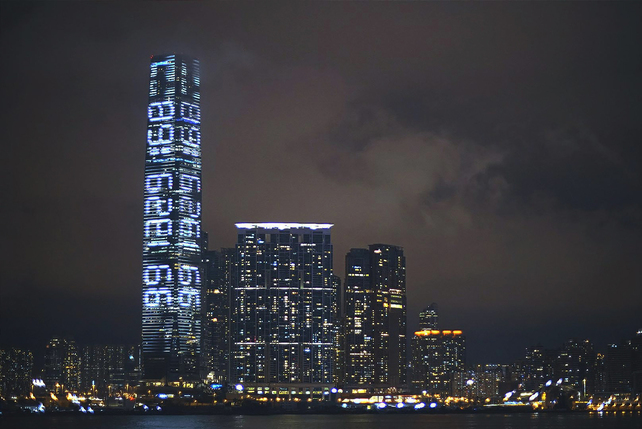News
Political Artwork on Hong Kong’s Tallest Skyscraper Removed


On Sunday May 22, the Hong Kong Arts Development Council (HKADC) declared the removal of a light installation that was shown on the facade of Hong Kong’s tallest skyscraper, the International Commerce Centre (ICC).
The installation, just over nine minutes long and originally entitled Our 60 second friendship starts now (2016), is a collaborative work by Hong Kong artists Sampson Wong and Jason Lam, commissioned by HKADC as part of the public media-arts group exhibition “Human Vibrations.” Wong and Lam’s installation, in which a seemingly random series of numbers and Chinese characters cascade down the 188-level tower, was first projected on May 17, coinciding with the opening of the exhibition.
After its initial projection, the artists revealed to select media outlets that, in fact, the digits in the final minute of the animation represent the number of seconds until July 1, 2047, the day on which Hong Kong and China’s 50-year “one country, two systems” agreement is due to expire. The countdown makes clear insinuations at rising anxieties over the future dissolution of Hong Kong’s semi-autonomous status and the growing influence of the mainland Chinese administration on the city’s social and political spheres. The message caused further controversy, as the work’s display aligned with a high-profile three-day visit to Hong Kong by Zhang Dejiang, a member of the Communist Party’s Politburo Standing Committee in charge of overseeing Hong Kong and Macau affairs. Zhang’s visit was the first by a high-ranking Chinese official since the pro-democracy Umbrella Movement demonstrations in 2014.
A joint statement released on Sunday May 22 by HKADC’s chairman of film and media art group Ellen Pau and “Human Vibrations” exhibition curator Caroline Ha Thuc defended the decision to pull the plug on the artwork, claiming that Wong and Lam had changed the work’s original title and their artist statement following the exhibition’s opening on May 18 without consulting the organizers or curator involved. Pau and Thuc further explained that, to their knowledge, the original video was a largely apolitical animation bearing the title Our 60 second friendship starts now, and that they were only made privy of the subversive meaning underlying the work after the opening, when the artists offered the revelation.
On May 23, Wong and Lam responded to the statement by issuing their own, in which they demanded that HKADC “revoke the ungrounded statement and stop making untruthful claims against [them].” Addressing the allegations, the two artists asserted that they had not altered the original commission and that Thuc, who had selected and recommended the artwork, was in full knowledge of the inclusion of the countdown sequence and the message contained in the last minute of the video. When AAP reached out to the artists for comment last week, Wong stipulated that their original proposal was the same as their artist statement published on the exhibition's website, which has since been removed. The statement described the installation as intended to reference a scene from Hong Kong director Wong Kar Wai's highly acclaimed 1990 film, "Days of Being Wild," and "viewers are invited to re-enact the ephemeral possibility of a one-minute friendship by connecting with a person known or unknown nearby." Nonetheless, Wong further adds in his comment to AAP that while the artwork itself has not been changed, "the meaning of the artwork is altered."
In an email to AAP, also last week, Thuc noted that “it is fundamental to avoid confusions” in the events that have taken place. She reaffirmed that the decision to withdraw the work “is strictly due to [the] disrespect and non-professional attitude” of the artists, which the organizers felt jeopardized future opportunities for the art industry to work in Hong Kong’s public space, and was not an act of censorship. “I am totally in favor of the freedom of expression, willing to question what can be or cannot be shown in the public space or what would be the rules of the game for an artist to work within the public space,” she explained, “this kind of essential debate would be more fruitful for the Hong Kong art scene.”







